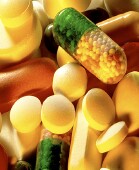Gene Therapy in Rats Reduces Cocaine Use
Boosting brain's dopamine receptors could lead to treatments for other addictions as well.
|
E-mail this article
Subscribe to news
Printer friendly version
|

(SOURCE: Brookhaven National Laboratory, news release, April 16, 2008)
FRIDAY, April 18 (HealthDay News) -- Using gene therapy to increase the level of dopamine -- a pleasure-related chemical -- receptors in rats' brains reduced their desire for cocaine by 75 percent, U.S. researchers say.
Previous research by the same team at the U.S. Department of Energy's Brookhaven National Laboratory, in Upton, N.Y., found that increasing the level of dopamine receptors reduced rats' desire for alcohol.
"By increasing dopamine D2 receptor levels, we saw a dramatic drop in these rats' interest in cocaine. This provides new evidence that low levels of dopamine D2 receptors may play an important role in not just alcoholism but in cocaine abuse as well. It also shows a potential direction for addiction therapies," study lead author Panayotis (Peter) Thanos, a neuroscientist with the Brookhaven Lab and the National Institute on Alcohol Abuse and Alcoholism Laboratory of Neuroimaging, said in a prepared statement.
The study was published online April 16 in the journal Synapse and was expected to be published in the July print edition of the journal.
D2 receptors receive signals triggered by dopamine, a neurotransmitter needed to experience feelings of pleasure and reward. Without these receptors, the brain's pleasure response is blunted, according to background information in the study.
Previous research showed that chronic alcohol and drug abuse increases dopamine production. However, long-term substance abuse depletes the brain's D2 receptors and rewires the brain so that normal pleasurable activities no longer stimulate these pathways. As a result, alcohol and/or drugs are the only way to feel pleasure.
The Brookhaven Lab studies suggest that increasing levels of D2 receptors in the brain could help treat addiction to alcohol, cocaine and other drugs.
More information
The U.S. National Institute on Drug Abuse has more about drug abuse and addiction.
Copyright © 2008 ScoutNews, LLC. All rights reserved. 
HealthDayNews articles are derived from various sources and do not reflect federal policy. healthfinder.gov does not endorse opinions, products, or services that may appear in news stories. For more information on health topics in the news, visit the healthfinder.gov health library.